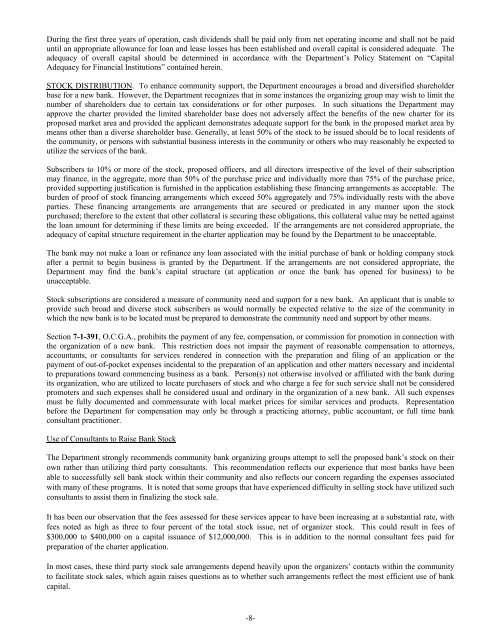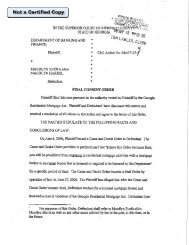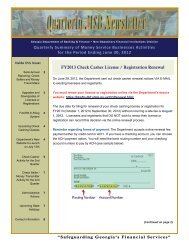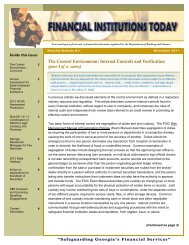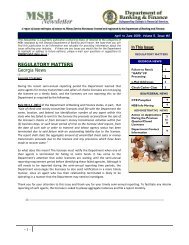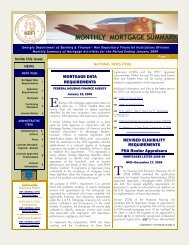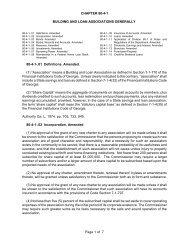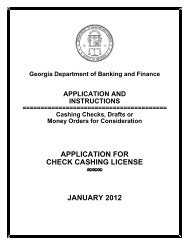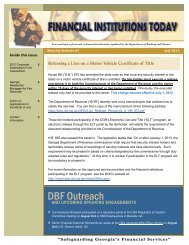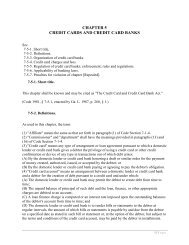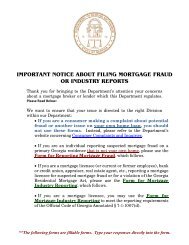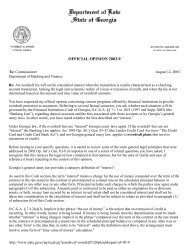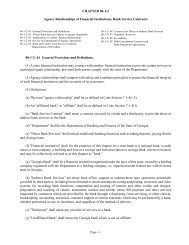facts about chartering a state-chartered bank - Department of ...
facts about chartering a state-chartered bank - Department of ...
facts about chartering a state-chartered bank - Department of ...
Create successful ePaper yourself
Turn your PDF publications into a flip-book with our unique Google optimized e-Paper software.
During the first three years <strong>of</strong> operation, cash dividends shall be paid only from net operating income and shall not be paid<br />
until an appropriate allowance for loan and lease losses has been established and overall capital is considered adequate. The<br />
adequacy <strong>of</strong> overall capital should be determined in accordance with the <strong>Department</strong>’s Policy Statement on “Capital<br />
Adequacy for Financial Institutions” contained herein.<br />
STOCK DISTRIBUTION. To enhance community support, the <strong>Department</strong> encourages a broad and diversified shareholder<br />
base for a new <strong>bank</strong>. However, the <strong>Department</strong> recognizes that in some instances the organizing group may wish to limit the<br />
number <strong>of</strong> shareholders due to certain tax considerations or for other purposes. In such situations the <strong>Department</strong> may<br />
approve the charter provided the limited shareholder base does not adversely affect the benefits <strong>of</strong> the new charter for its<br />
proposed market area and provided the applicant demonstrates adequate support for the <strong>bank</strong> in the proposed market area by<br />
means other than a diverse shareholder base. Generally, at least 50% <strong>of</strong> the stock to be issued should be to local residents <strong>of</strong><br />
the community, or persons with substantial business interests in the community or others who may reasonably be expected to<br />
utilize the services <strong>of</strong> the <strong>bank</strong>.<br />
Subscribers to 10% or more <strong>of</strong> the stock, proposed <strong>of</strong>ficers, and all directors irrespective <strong>of</strong> the level <strong>of</strong> their subscription<br />
may finance, in the aggregate, more than 50% <strong>of</strong> the purchase price and individually more than 75% <strong>of</strong> the purchase price,<br />
provided supporting justification is furnished in the application establishing these financing arrangements as acceptable. The<br />
burden <strong>of</strong> pro<strong>of</strong> <strong>of</strong> stock financing arrangements which exceed 50% aggregately and 75% individually rests with the above<br />
parties. These financing arrangements are arrangements that are secured or predicated in any manner upon the stock<br />
purchased; therefore to the extent that other collateral is securing these obligations, this collateral value may be netted against<br />
the loan amount for determining if these limits are being exceeded. If the arrangements are not considered appropriate, the<br />
adequacy <strong>of</strong> capital structure requirement in the charter application may be found by the <strong>Department</strong> to be unacceptable.<br />
The <strong>bank</strong> may not make a loan or refinance any loan associated with the initial purchase <strong>of</strong> <strong>bank</strong> or holding company stock<br />
after a permit to begin business is granted by the <strong>Department</strong>. If the arrangements are not considered appropriate, the<br />
<strong>Department</strong> may find the <strong>bank</strong>’s capital structure (at application or once the <strong>bank</strong> has opened for business) to be<br />
unacceptable.<br />
Stock subscriptions are considered a measure <strong>of</strong> community need and support for a new <strong>bank</strong>. An applicant that is unable to<br />
provide such broad and diverse stock subscribers as would normally be expected relative to the size <strong>of</strong> the community in<br />
which the new <strong>bank</strong> is to be located must be prepared to demonstrate the community need and support by other means.<br />
Section 7-1-391, O.C.G.A., prohibits the payment <strong>of</strong> any fee, compensation, or commission for promotion in connection with<br />
the organization <strong>of</strong> a new <strong>bank</strong>. This restriction does not impair the payment <strong>of</strong> reasonable compensation to attorneys,<br />
accountants, or consultants for services rendered in connection with the preparation and filing <strong>of</strong> an application or the<br />
payment <strong>of</strong> out-<strong>of</strong>-pocket expenses incidental to the preparation <strong>of</strong> an application and other matters necessary and incidental<br />
to preparations toward commencing business as a <strong>bank</strong>. Person(s) not otherwise involved or affiliated with the <strong>bank</strong> during<br />
its organization, who are utilized to locate purchasers <strong>of</strong> stock and who charge a fee for such service shall not be considered<br />
promoters and such expenses shall be considered usual and ordinary in the organization <strong>of</strong> a new <strong>bank</strong>. All such expenses<br />
must be fully documented and commensurate with local market prices for similar services and products. Representation<br />
before the <strong>Department</strong> for compensation may only be through a practicing attorney, public accountant, or full time <strong>bank</strong><br />
consultant practitioner.<br />
Use <strong>of</strong> Consultants to Raise Bank Stock<br />
The <strong>Department</strong> strongly recommends community <strong>bank</strong> organizing groups attempt to sell the proposed <strong>bank</strong>’s stock on their<br />
own rather than utilizing third party consultants. This recommendation reflects our experience that most <strong>bank</strong>s have been<br />
able to successfully sell <strong>bank</strong> stock within their community and also reflects our concern regarding the expenses associated<br />
with many <strong>of</strong> these programs. It is noted that some groups that have experienced difficulty in selling stock have utilized such<br />
consultants to assist them in finalizing the stock sale.<br />
It has been our observation that the fees assessed for these services appear to have been increasing at a substantial rate, with<br />
fees noted as high as three to four percent <strong>of</strong> the total stock issue, net <strong>of</strong> organizer stock. This could result in fees <strong>of</strong><br />
$300,000 to $400,000 on a capital issuance <strong>of</strong> $12,000,000. This is in addition to the normal consultant fees paid for<br />
preparation <strong>of</strong> the charter application.<br />
In most cases, these third party stock sale arrangements depend heavily upon the organizers’ contacts within the community<br />
to facilitate stock sales, which again raises questions as to whether such arrangements reflect the most efficient use <strong>of</strong> <strong>bank</strong><br />
capital.<br />
-8-


